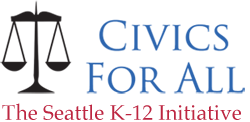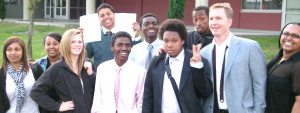Published Articles
Education Week: “Make Mock Elections Mandatory”
Voter turnout is in crisis; better civics training in school can help
Education Week: “Anti-Bullying, Civics Education Should Align, Support Each Other”
…The notion that students should stand up for their weaker classmates, for the “outsiders,” harks back to democracy’s loftiest ideals, like equal justice under law, “e pluribus unum,” and “majority rule, minority rights.”…
School bonds: School construction funded unfairly
A little-known root cause: Article IX, Sec. 3 of our state Constitution stipulates that timber revenue from the Department of Natural Resources trust lands must help fund school construction.
Crosscut.com: “Stop Funding School Construction with Clear Cuts”
Education and nature are sacred in Washington. Yet when we build new schools, tens of thousands of trees on state trust lands are felled to fund their construction.
Seattle Times: “Want engaged citizens? Start with civics in school”
Seattle can do a better job developing engaged citizens by strengthening education in civics, according to guest columnists Web Hutchins and Judith Billings.
Education Week: “Civics in the Common Core”
This year, educators and their fellow citizens celebrate the 50th anniversary of Martin Luther King Jr.’s ethereal “I Have a Dream” speech and his prophetic “Letter From Birmingham Jail.” The unbridled urgency of King’s passion for justice almost jumps from the page, transcending time and inspiring us today to build civically engaging schools for all our children.
Education Week: “Civics and Censorship”
As I read Frank D. LoMonte’s chilling Commentary about widespread censorship of high school journalists and newspapers (“A Muzzled Generation,” Feb. 6, 2013), I recalled U.S. Supreme Court Justice Louis D. Brandeis’ brilliant defense of free speech and dissent in his famous Whitney v. California (1927) opinion. Brandeis, fondly known as “the people’s judge,” was also an academic and he knew our profession well.
Seattle Times: “Federal government looks into Seattle schools’ treatment of black students”
While race bias in schools is a persistent national scourge, we can thwart this problem where it lives — in the daily crucible of each classroom. Civics education is the silver bullet. It improves academic achievement for black students, minimizes unacceptable behavior and makes scarce ugly, racially charged conflict between students and teachers.



Connect & Share